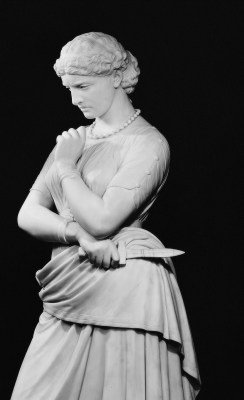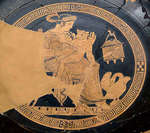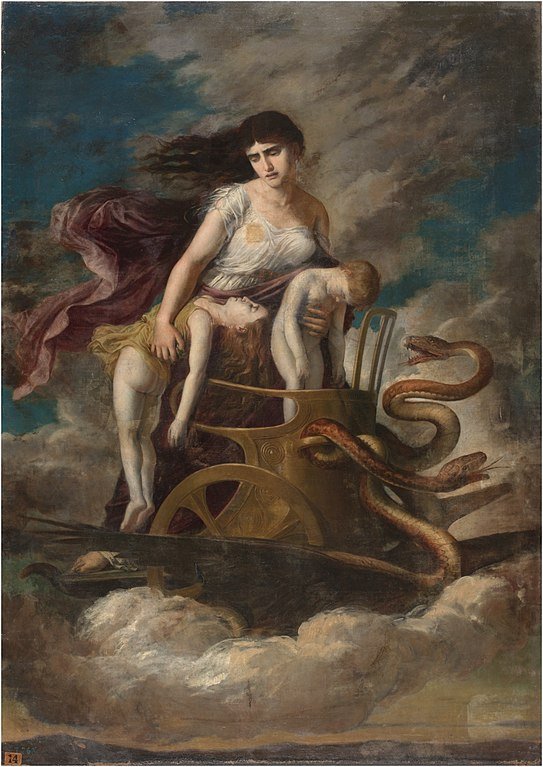
Circe
The daughter of Helios and Perse, Circe was a powerful enchantress versatile in the arts of herbs and potions and capable of turning human beings into animals. She did just that to Odysseus’ sailors when they reached her dwelling place, the secluded island of Aeaea. Odysseus, however, managed to trick her with the help of Hermes and, instead of becoming an animal, he became her lover for a year. The couple had three children, one of whom, Telegonus, eventually killed Odysseus.
Family
Circe was the daughter of Perse, one of the Oceanids, and Helios, the Titan sun god. As such, she was part of a family of formidable sorceresses. Pasiphae, who supposedly charmed both Minos and Procris, was her sister, and the even more notorious enchantress Medea was her niece, since she was the daughter of Circe’s brother Aeetes, the guardian of the Golden Fleece. Circe had another brother, Perses, who was slain by Medea after he had deposed her father Aeetes from the throne of Colchis.
Circe and Odysseus
Circe is best known from the following episode from Homer’s “Odyssey.”
Reaching Circe’s Island
Disheartened and dispirited from their horrendous encounter with the man-eating Laestrygonians – after which they had been left with only one out of their twelve ships – Odysseus and his remaining men land on Aeaea, Circe’s island.
At first glance, it seems to them like a desolate island, since the only visible sign of life is a column of smoke rising from somewhere deep in the woods. Naturally, Odysseus sends his men to investigate, putting his brother-in-law Eurylochus in charge of the scouting party.
The Transformation of Odysseus’ Men
After some time, the men reach Circe’s house and are surprised to find many fearsome beasts – mostly lions and wolves – slouching around and acting as domesticated as the tamest pets imaginable. From the inside, they hear a woman’s voice: it’s Circe singing melodiously.
Eurylochus suspects danger, so he chooses to stay outside as Circe comes out of her house and welcomes the rest of the scouting party indoors. Odysseus’ men are treated with some fine-flavored wine they gulp down in a second with the utmost pleasure. However, once they do that, Circe makes a quick move with her wand and, suddenly, all of Odysseus’ men are transformed into pigs. They still have their human brains, so they start grunting and weeping as Circe puts them into her pigsty.
Odysseus Tricks Circe
Eurylochus runs back to Odysseus and tells him the whole story and Odysseus decides to confront Circe. Fortunately, on his way to Circe’s house, he is met by Hermes, who gives him a magical black-rooted white-flowered plant called moly which, the divine messenger says, will make Odysseus immune to Circe’s spells.
As indicated by Hermes, Circe’s wine has no effect on the cunning Greek hero and so, after the enchantress pulls out her wand, Odysseus responds by pulling out his sword. He makes Circe swear that she won’t hurt him and forces her to restore the original form of all his sailors. Circe does precisely that and, furthermore, taken aback by his bravery, offers Odysseus her sincere love and unconditional devotion.
Odysseus accepts them, and, as a result, his men stay in Aeaea for almost a year, after which Odysseus becomes restless to go back to Ithaca and once again see his mortal wife, Penelope.
Odysseus’ and Circe’s Offspring
If we are to believe Hesiod’s genealogies, however, we must deduce that Odysseus returned to Aeaea once or twice more after this, or at least that he stayed there for a little longer than a year. Since Circe – says Hesiod – bore him no less than three children: Agrius, Latinus, and Telegonus. The last and youngest one of the three ended up killing Odysseus by mistake using a poisoned spear given to him by his mother.
Circe in Other Myths
Circe plays a smaller part in few other myths: she purifies Jason and Medea from a murder, and she transforms PIcus and Scylla into a woodpecker and monster respectively.
Jason and Medea
Circe shows up in the second most famous Ancient Greek story of sea adventures, the voyage of the Argonauts. According to Apollonius, after Jason and Medea treacherously and brutally kill the Colchian prince Absyrtus, it is Circe who purifies them from the sin, though she also chases them away from her island once she learns the full gravity of their transgression.
Circe, a Vengeful Lover
Before falling for Odysseus, Circe felt an attraction to at least two other men, the first one a mortal, and the second one a god.
The mortal was Picus, who was too faithful to his wife Canens for his own sake: after fiercely rejecting Circe’s advances, Picus was turned into a woodpecker. Unable to fight through the unbearable sorrow, six days later, Canens threw herself into the river Tiber.
Another time, the sea-god Glaucus asked Circe for a potion which would make the beautiful nymph Scylla fall in love with him. Circe, however, loved Glaucus for herself, so, when he scorned her, she gave him a potion which turned Scylla into the hideous sailor-preying monster Odysseus and his crew had to evade soon after leaving Circe’s island.
Sources
The story of Circe and Odysseus is recounted by Homer in the tenth book of the “Odyssey.” For the episode with Jason and Medea, consult the fourth book of Apollonius’ “Argonautica.”
See Also: Odysseus, Medea, Pasiphae, Scylla
Circe Video
Circe Q&A
Link/Cite Circe Page
Written by: The Editors of GreekMythology.com. GreekMythology.com editors write, review and revise subject areas in which they have extensive knowledge based on their working experience or advanced studies.
For MLA style citation use: GreekMythology.com, The Editors of Website. "Circe". GreekMythology.com Website, 01 Jun. 2018, https://www.greekmythology.com/Other_Gods/Circe/circe.html. Accessed 26 April 2024.






